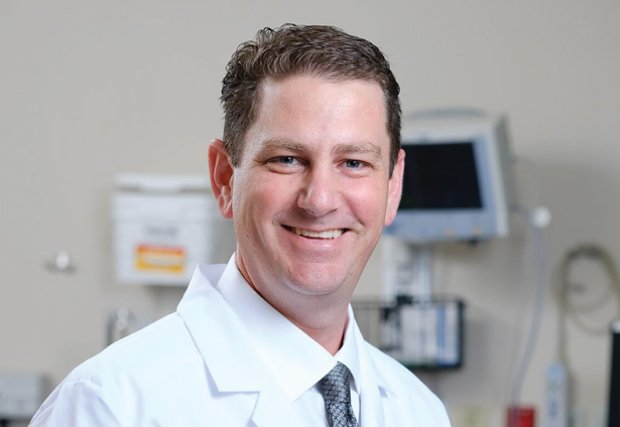Adam M. Bromberg, MD, pictured above, says, “The accrediting bodies recognize Wellington Regional Medical Center as a premier site."
In recognition of its commitment to treating patients with cardiac emergencies, Wellington Regional Medical Center (WRMC) was recently awarded Chest Pain Center Accreditation with Primary PCI and Resuscitation from the American College of Cardiology (ACC). The accreditation was based on a rigorous onsite assessment of the staff’s ability to evaluate, diagnose and treat patients who may be experiencing a heart attack. WRMC is the first hospital in Palm Beach County to achieve this recognition.
What Sets WRMC Apart?
There are two key parts to the accreditation that distinguish care at WRMC, notes Adam M. Bromberg, MD, Vice Chief of Staff and Chairman of the Department of Emergency Services. The first is percutaneous coronary intervention (PCI), also known as coronary angioplasty. This is a non-surgical procedure that uses a balloon to open blocked arteries for patients who have suffered a heart attack.
“We’ve shown excellence in getting patients to the cath lab quickly and effectively for a coronary intervention,” says Dr. Bromberg. “Time is muscle.” In other words, the longer it takes for a patient to receive care, the greater the risk of potential damage to the heart.
Additionally, WRMC has gone “above and beyond” to earn designation for Resuscitation in treating patients who experience cardiac arrest, Dr. Bromberg notes. This includes access to potentially life-saving hypothermia therapy, if needed.
What is Cardiac Arrest, and How Can Specialized Care Help?
Cardiac arrest is different from a heart attack and occurs when the heart suddenly stops beating because of an electrical malfunction. It can be more common after a heart attack and can cause brain damage or be fatal, so getting prompt, effective treatment is critical, Dr. Bromberg notes. For select patients, lowering the body’s temperature through hypothermia therapy can support recovery and reduce the risk of damage to the brain, Dr. Bromberg explains.
As described by the ACC, “The addition of the Resuscitation designation to Chest Pain Center with PCI accreditation enhances outcomes because the facility will have initiated early strategies such as early recognition, CPR and defibrillation, early intervention with Primary PCI simultaneously with post arrest hypothermia treatment.”
Promoting Awareness
To help ensure the most timely, effective care, it’s essential that people know the signs of a possible heart attack and call 9-1-1 right away if they recognize any of the symptoms, Dr. Bromberg emphasizes. With this in mind WRMC continually works to educate the community and has also conducted training throughout the hospital.
“Early recognition is key,” notes Dr. Bromberg. It’s vitally important that people who are experiencing a possible heart attack get the right care right away at a facility like WRMC that is specially equipped to support the best outcomes, he says.
POSSIBLE HEART ATTACK SYMPTOMS VARY BETWEEN MEN AND WOMEN*
Men
Classic heart attack symptoms*
- Chest pain or discomfort
- Discomfort in one or both arms, the back, neck, jaw or stomach
- Shortness of breath
- Cold sweat, nausea or light-headedness
*American Heart Association
Women
Common heart attack symptoms**
- Unusually heavy pressure on the chest
- Sharp upper body pain in the neck, back and jaw
- Severe shortness of breath
- Cold sweats (not hot flashes from menopause)
- Unusual or unexplained fatigue
- Unfamiliar dizziness or light-headedness
- Unexplained nausea or vomiting
**Centers for Disease Control and Prevention (CDC)
If you have any of these signs, call 9-1-1 and get to a hospital right away.


